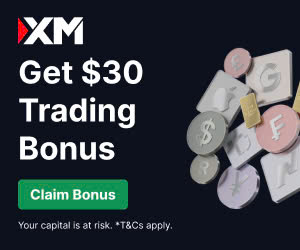
8 minute read
XM vs Delta Exchange: A Comprehensive Comparison
In the rapidly evolving world of online trading, choosing the right platform can make or break your financial journey. Whether you're a forex enthusiast, a crypto derivatives trader, or someone exploring both markets, the decision between XM vs Delta Exchange is critical. Both platforms have carved out significant niches—XM as a versatile forex and CFD broker, and Delta Exchange as a specialized cryptocurrency derivatives exchange. This in-depth guide compares XM vs Delta Exchange across key dimensions, including features, fees, user experience, security, and more, to help you decide which platform aligns best with your trading goals in 2025.

💥 Trade with XM now: Open An Account or Visit Brokers 🏆
Overview of XM vs Delta Exchange
XM: A Trusted Forex and CFD Broker
Founded in 2009, XM is a globally recognized broker headquartered in Cyprus, serving over 5 million clients across 190 countries. Regulated by top-tier authorities like the Cyprus Securities and Exchange Commission (CySEC), the Australian Securities and Investments Commission (ASIC), and the Financial Services Commission (FSC), XM is known for its transparency, low spreads, and diverse asset offerings. Traders can access forex pairs, commodities, indices, stocks, and cryptocurrencies through industry-standard platforms like MetaTrader 4 (MT4) and MetaTrader 5 (MT5). XM’s user-friendly interface, competitive trading conditions, and extensive educational resources make it a favorite among beginners and seasoned traders alike.
Delta Exchange: A Crypto Derivatives Specialist
Launched in 2018, Delta Exchange is a younger platform headquartered in Singapore and registered in Saint Vincent and the Grenadines. It focuses exclusively on cryptocurrency derivatives, offering futures, options, and perpetual swaps for assets like Bitcoin (BTC), Ethereum (ETH), and various altcoins. With leverage up to 100x and innovative products like MOVE contracts, Delta Exchange caters to crypto enthusiasts and advanced traders seeking to capitalize on market volatility. While less regulated than XM, it prioritizes security with measures like cold storage and multi-signature wallets.
Key Features Comparison
1. Trading Instruments
· XM: XM offers over 1,000 tradable instruments, including 100+ forex pairs, commodities (e.g., gold, oil), indices, stocks, and cryptocurrencies. This diversity allows traders to build varied portfolios and explore multiple markets within a single platform.
· Delta Exchange: Delta Exchange specializes in crypto derivatives, supporting over 50 cryptocurrencies and 80+ trading pairs. Its offerings include futures, options, perpetual swaps, and unique MOVE contracts, which allow traders to profit from price movements without owning the underlying asset. However, it lacks traditional assets like forex or commodities.
Verdict: XM is ideal for traders seeking a broad range of assets, while Delta Exchange is better suited for those focused solely on crypto derivatives.
2. Trading Platforms
· XM: XM provides MT4 and MT5, both renowned for their advanced charting tools, customizable indicators, and support for automated trading via Expert Advisors (EAs). These platforms are available on desktop, web, and mobile, ensuring seamless access. XM also offers a proprietary mobile app for quick trading.
· Delta Exchange: Delta Exchange uses a proprietary platform optimized for crypto derivatives trading. It features real-time data, advanced charting tools, and a user-friendly interface. The platform is accessible via web and a mobile app for iOS and Android, with a TradingView integration for enhanced analysis. A demo trading feature allows beginners to practice without risking funds.
Verdict: XM’s MT4/MT5 platforms are more versatile for multi-asset trading, while Delta Exchange’s platform excels for crypto-specific features and ease of use.
3. Fees and Spreads
· XM: XM is known for low spreads, starting at 0.6 pips on major forex pairs for its Ultra-Low Spread accounts. It offers commission-free trading on Standard accounts, though Micro and Ultra-Low accounts may incur small commissions. XM has no deposit or withdrawal fees, and its fee structure is transparent.
· Delta Exchange: Delta Exchange employs a maker-taker fee model, with spot trading fees at 0.05% and futures/options fees ranging from 0.02% (maker) to 0.05% (taker). Settlement fees apply for futures and options, but VIP members holding Delta Exchange Tokens (DETO) or high trading volumes can receive up to 60% fee discounts.
Verdict: XM offers lower costs for forex and CFD trading, while Delta Exchange’s fees are competitive for crypto derivatives, especially with discounts.
4. Leverage
· XM: XM provides flexible leverage up to 1:1000 for forex (depending on the region and account type), though crypto trading leverage is lower (up to 1:100). High leverage appeals to experienced traders but increases risk.
· Delta Exchange: Delta Exchange offers leverage up to 100x for crypto derivatives, enabling traders to amplify positions with smaller capital. This high leverage is attractive for risk-tolerant traders but requires careful risk management.
Verdict: Delta Exchange offers higher leverage for crypto trading, while XM provides more flexibility across asset classes.
5. Educational Resources
· XM: XM excels in trader education, offering webinars, video tutorials, articles, eBooks, and live seminars. Topics cover forex basics, technical analysis, risk management, and market trends, catering to all skill levels.
· Delta Exchange: Delta Exchange provides crypto-focused resources through its Delta Academy, including video courses, guides, and blog posts on derivatives trading. It also hosts trading competitions to foster community learning. However, its resources are narrower, focusing solely on crypto.
Verdict: XM’s broader educational offerings make it better for beginners, while Delta Exchange is sufficient for crypto-focused traders.
User Experience and Accessibility
XM
XM’s platforms are designed for ease of use, with intuitive interfaces on MT4, MT5, and its mobile app. Traders can access real-time charts, manage orders, and track portfolios effortlessly. The platform supports over 20 payment methods, including bank cards, e-wallets, and crypto, with fast withdrawals (often within 24 hours). However, XM is unavailable in the US due to regulatory restrictions.
Delta Exchange
Delta Exchange offers a clean, crypto-centric interface tailored for derivatives trading. Its mobile app provides real-time price tracking and order management, ensuring traders stay connected. The platform supports crypto deposits (e.g., BTC, USDT) but lacks fiat funding options. Regional restrictions apply, including no support for the US, Cambodia, or Iran.
Verdict: XM offers a more seamless experience for global users with diverse payment options, while Delta Exchange is streamlined for crypto traders but limited by fiat restrictions.

💥 Trade with XM now: Open An Account or Visit Brokers 🏆
Security and Regulation
XM
XM is heavily regulated by CySEC, ASIC, and FSC, ensuring client funds are segregated and protected. It offers negative balance protection, meaning traders cannot lose more than their deposits. With over a decade of operation, XM has built a reputation for reliability and transparency.
Delta Exchange
Delta Exchange operates with less regulatory oversight, registered in Saint Vincent and the Grenadines. However, it emphasizes security through cold storage, multi-signature wallets, and two-factor authentication (2FA). No major hacks have been reported, but some users have raised concerns about account blocks and delayed withdrawals.
Verdict: XM’s robust regulation makes it a safer choice for risk-averse traders, while Delta Exchange’s security measures are solid but lack the backing of top-tier regulators.
Customer Support
XM
XM offers 24/5 customer support via live chat, email, and phone in multiple languages. Traders praise its responsiveness and professionalism, with quick resolutions to issues.
Delta Exchange
Delta Exchange provides support through email and live chat, but its hours are limited compared to XM. While generally responsive, some users report delays in addressing complex issues like account verification or withdrawals.
Verdict: XM’s broader and faster support gives it an edge over Delta Exchange.
Pros and Cons
XM
Pros:
· Diverse asset classes (forex, stocks, crypto, etc.).
· Low spreads and transparent fees.
· Top-tier regulation (CySEC, ASIC, FSC).
· Extensive educational resources.
· User-friendly MT4/MT5 platforms.
Cons:
· Unavailable in the US.
· Lower leverage for crypto compared to Delta Exchange.
Delta Exchange
Pros:
· Specialized crypto derivatives (futures, options, perpetuals).
· High leverage up to 100x.
· Competitive fees with VIP discounts.
· Innovative products like MOVE contracts.
· Demo trading for beginners.
Cons:
· Limited to crypto assets.
· Less regulatory oversight.
· Restricted in several countries (e.g., US, Iran).
· Mixed user reviews on support and withdrawals.
Which Platform Suits You?
Choose XM If:
· You’re a beginner or intermediate trader seeking a versatile platform.
· You want to trade multiple asset classes (forex, stocks, commodities, crypto).
· Regulatory compliance and fund safety are priorities.
· You value extensive educational resources and 24/5 support.
Choose Delta Exchange If:
· You’re an experienced trader focused on crypto derivatives.
· You want high leverage (up to 100x) and innovative crypto products.
· You’re comfortable with a crypto-only platform and moderate regulation.
· You prefer a specialized interface for futures and options trading.
Conclusion
The choice between XM vs Delta Exchange boils down to your trading style and priorities. XM is a versatile, heavily regulated broker ideal for traders seeking diverse assets, low costs, and robust support. Delta Exchange, with its focus on crypto derivatives, high leverage, and innovative features, appeals to advanced traders comfortable with crypto volatility and moderate regulation. Both platforms have unique strengths, but your decision should align with your financial goals, risk tolerance, and market preferences.
💥 Note: To enjoy the benefits of the partner code, such as trading fee rebates, you need to register with XM through this link: Open An Account or Visit Brokers 🏆
Read more:

